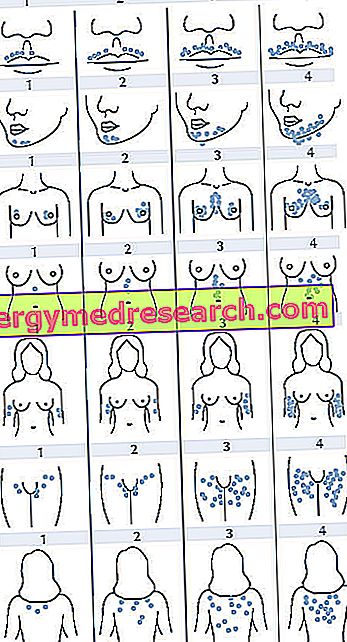All links to the topic PROTEIN; select the topic of your interest or continue reading the summary article.
Proteins or proteins (from the Greek protos, "primary") represent a large group of organic compounds formed by sequences of amino acids linked together through peptide bonds. We can imagine amino acids as the building blocks of proteins and peptide bonds as the glue that holds them together.

Proteins are subject to a continuous process of demolition and synthesis - the so-called protein turnover - through which the body is able to continuously renew worn-out proteins, replacing them with new protein material. Moreover, this process allows the body to replace the amino acids used for energy purposes and to deposit new ones to reinforce certain tissues (for example following physical exercise). The proportion of amino acids that are degraded daily is around 30-40 g / day on average.
This quota is called protein proportion of wear and must be introduced daily with the diet because our body does not have protein reserves; all the proteins present in our body (about 12-15% of body mass) are in fact functional.
There are 20 amino acids involved in protein synthesis and 20 of these are essential [leucine, isoleucine and valine (BCAA), lysine, methionine, threonine, phenylalanine, tryptophan]; during growth two other amino acids, arginine and histidine become essential.
The essential term indicates the body's inability to synthesize these amino acids from other amino acids by biochemical transformations. These amino acids must therefore be introduced with the diet. Foods of animal origin have the best amino acid profile because they generally have all the essential amino acids in good quantities. Unlike these, foods of vegetable origin usually have deficiencies of one or more essential amino acids. However, these deficiencies can be overcome through the right food associations such as PASTA and FAGIOLI. In this case we speak of mutual integration because the amino acids of which the pasta is lacking are supplied by the beans and vice versa.
CALORIES: Burning a gram of protein produces an average heat of 5.65 Kcal. However, since our body is unable to use the nitrogen contained in them, their energy power is reduced to 4.35 Kcal per gram.
Normally 92% of the proteins introduced with the diet are absorbed (97% of the animal ones and 78% of the vegetable ones).
It follows the proteins they supply to our body on average 4 Kcal per gram .
Protein digestion
At the gastric level (stomach) proteins undergo a partial degradation in amino acids (thanks to the action of the gastric juice and hydrochloric acid) which will be completed in the first part of the small intestine (duodenum).
TO OPTIMIZE DIGESTION AND ABSORPTION OF PROTEINS it is good:
|
Role of proteins in the body
- As we have already said, the main function of proteins is to supply the amino acids necessary for tissue renewal processes (plastic function).
- Proteins are also custodians of the genetic code (DNA and RNA of the cell nucleus)
- They act as carriers (carriers) of various substances present in the blood (hemoglobin, hormones, etc.).
- They act as neurotransmitters (serotonin)
- They intervene in blood coagulation.
- They are necessary for muscle contraction and the body's immune defense.
- They are precursors of enzymes that regulate the speed of reactions and that intervene in the various metabolisms of the body.
- Proteins also have an energy function in particular conditions, but in a balanced diet this role is marginal. Instead, this process is active during prolonged fasting when branched chain amino acids (leucine, isoleucine, valine) are degraded for energy purposes or during prolonged and / or very intense physical activity.
Protein functions
X Problems with video playback? Reload from YouTube Go to Video Page Go to Wellness Destination Watch the video on youtubeHow many proteins in a balanced diet?
Nutritionists recommend taking during the day a quantity of proteins equal to about 15-20% of the total daily caloric intake equal to 0.8-1 g of protein per Kg of body weight.
What kind?
These proteins should derive 2/3 from products of animal origin and 1/3 from products of vegetable origin.
REMEMBER, the protein requirement is inversely proportional to age:
2 g / kg / day in the newborn, 1.5 g / kg / day at 5 years, 1.2 g / kg / day in adolescence - adult;Are all proteins the same?
The amount of protein is not the only important parameter; in order for a diet to be considered balanced, protein quality must also be considered.
CONTINUE: Protein quality »



